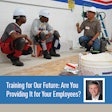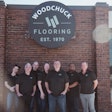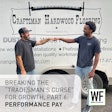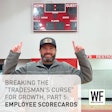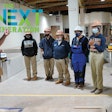
A lot of pros don’t realize the importance of having a CPA to look over your shoulder to make sure you are doing everything the right way—the legal way—to do things. That goes not only for taxes but also as far as paying unemployment and workers comp. Many pros don’t take it seriously, but I’ve always taken a very serious stance with it because of something that happened to me when I was 20 years old.
My dad’s company started in 1958, and I grew up working alongside him. When I went away to college, I would come home on the weekends to work for Dad. One Friday in 1985 I came home and there was a woman in the basement of our house where he had a little showroom—she was an auditor from the IRS.
I asked my parents what was going on, and their answer was terrifying: My dad was facing six to eight years in prison and something like $100,000 for back taxes. The auditor was going through the books with a fine-toothed comb, job by job, to find irregularities, right down to receipts for buying gas to go to a particular job.
A friend of mine from high school was studying accounting, so I called him and asked what we should do. He had me talk with his boss immediately, and he told me who to call. We had to get an “enrolled agent.” Enrolled agents are accountants who are federally qualified by the IRS to represent clients in cases like audits, collections and appeals. We also had to hire an attorney.
The first thing the enrolled agent did was stop the IRS agent at my parents’ house. Even the enrolled agent thought that our case was highly unusual, and as he worked on our case with our attorney and my parents, they realized the audit had been triggered by an unhappy customer who called the IRS and told them they thought my father should be investigated for tax fraud.
With the enrolled agent, they spent months cleaning up the books. My dad’s company was typical for our industry: You start by yourself, then maybe you hired a helper, then maybe a couple more workers. Maybe you or your spouse are paying the bills—not necessarily someone with a business or accounting background who knows the ins and outs of the law. Then you’ve probably been doing something for five years or more, and what you’re doing may not be correct.
It probably took six months to a year for them to sort out everything. It was basically a forensic accounting process, and this was when computers were just starting to be used for business, so it was all literally paperwork. My mom was still doing the payroll by hand. They went through every job figuring out materials expenses, other job expenses, payroll—all of it.
A positive of the process was that the enrolled agent found things my parents weren’t taking advantage of, like claiming expenses for having a home office, a showroom in our home, and half the garage used for the business. Because of that, my parents ended up paying something like $15,000 instead of the original $100,000, and my dad didn’t go to prison.
It’s a sobering process to watch your parents go through that, and because of that, when I started my own company, I had already learned some serious lessons.
The most important one was to use a trained CPA for my books. As a floor pro, you don’t know the IRS rules. They can advise you on what expenses are legitimate, or which $500 writeoff isn’t worth opening the door to the IRS. They will keep you in line. They will also help you figure out legitimate ways to protect your income from taxes, like setting up retirement plans.
Another lesson I learned was to keep a meticulous record of which expenses go to which job. When you buy 30 sheets of plywood or 5 gallons of finish or charge the gas to the business card, which project was that for?
One area where I see wood floor pros treading dangerously is with subcontractors. You have to know the most up-to-date rules about hiring subcontractors, or that can easily go south when it comes to your taxes.
Another area is claiming personal expenses as business expenses. I know someone who writes off his laundry detergent and washing machine at his house as a business expense because he has to wash his work clothes. Is it worth raising the suspicion of the IRS?
Another factor where some contractors live dangerously is with cash, either paying employees in cash or getting paid in cash. It creates a huge amount of exposure that isn’t worth it. As my dad found out, all it takes is one unhappy customer to call the IRS and raise a suspicion. If you let a customer know that you will do a job for less for cash, that’s all they need to call the IRS and begin a nightmare process for you and your company.






















